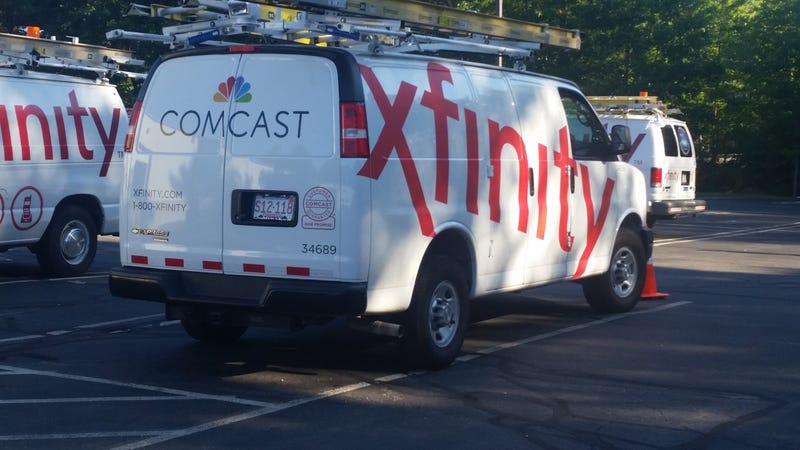 Comcast trucks parked outside a Westford, Massachusetts operations center in 2015.Photo: Tali Arbel (AP)
Comcast trucks parked outside a Westford, Massachusetts operations center in 2015.Photo: Tali Arbel (AP)
Comcast and a bevy of cable giants including Fox, CBS, and Disney are suing the state of Maine and 17 municipalities over a recently passed state law that mandates cable TV operators allow subscribers to pick and choose which channels and programs they want to pay for, the Bangor Daily News reported this week.
The law in question mandates that “a cable system operator shall offer subscribers the option of purchasing access to cable channels, or programs on cable channels, individually.” According to the Daily News, the bill was by Independent state Representative Jeff Evangelos and “passed largely along party lines”; Democratic Governor Janet Mills did not sign the bill, but allowed it to be passed into law. Comcast and the other companies are suing to prevent its implementation on Sept. 19, arguing that it is preempted by federal law
The Federal Communications Commission, however, indicated in a letter to state officials that it views the matter as unsettled:
Evangelos defended the proposal by telling WGME in March, “I want to watch the Red Sox, but I don’t want to watch [televangelist] Jimmy Swaggart, so I shouldn’t be forced to pay for that.” Comcast and Charter Communications argued it was preempted by federal law.
Maine Public Advocate Barry Hobbins noted that providers had successfully argued that in other debates in the past, but the Federal Communications Commission told Hobbins in a letter that whether the state law would be preempted was “a question of first impression” and there were no commission rulings that address the a la carte issue.
Advocates of the law have also pointed to an FCC statement that says “There is no law that requires (or prohibits) cable companies to offer channels or programs on an à la carte basis.”
The companies’ lawsuit, filed in U.S. District Court late last week, asks the court to delay the Sept. 19 date and throw out the law entirely on the grounds of both federal preemption and the First Amendment, the Daily News wrote. It’s obvious why they’re taking this stance; cable companies say that bundling packages of channels allows them to subsidize a wide variety of programming that would otherwise be too niche to survive. They’ve also argued that it puts them at a competitive disadvantage to streaming services and satellite TV.
According to Ars Technica, the plaintiffs wrote in court documents that “Programmers often negotiate license fees with cable operators based on tiered carriage, and eliminating such carriage would force programmers to charge higher license fees to cable operators, which ultimately would be passed on to subscribers.” Ars Technica noted that the 17 municipalities are named because they have the authority to enforce state law, with the list covering “Maine municipalities where Comcast has franchise agreements.”
A 2012 piece in the Atlantic argued that the battle over bundling is really a battle between streaming upstarts and cable TV, “the most dependable and lucrative business model in modern entertainment history.” Customers who watch a large amount of TV on premium channels are essentially subsidized by other customers who watch far less; on the other hand, the Atlantic wrote, the internet is “ruthlessly efficient at stripping cross-subsidies and allowing content to shine on its own,” as it did in the music and print journalism businesses.
On the other hand, the price of cable TV has skyrocketed in recent years as cable operators try to preserve the status quo, which critics have argued is only hastening the demise of the bundle. (In some cases cable internet companies also try to force customers to purchase TV packages to get faster connections.) As the Daily News noted, a 2019 survey by the West Monroe Partners consultancy found that only 10 states are cord-cutting faster than Maine.
“I submitted this bill on behalf of Maine’s hundreds of thousands of cable television subscribers,” Evangelos said in testimony supporting the bill. “For far too long, consumers have been forced to purchase cable TV packages which include dozens of channels the consumer has no interest in watching.”
Share This Story